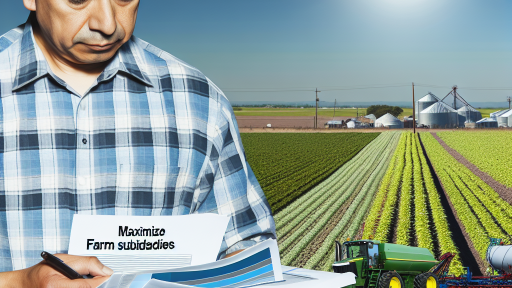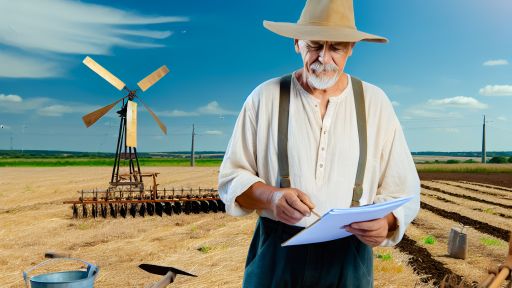Introduction to Financial Aid in Sustainable Farming
Financial aid is crucial for sustainable farming initiatives.
Many farmers seek assistance to implement eco-friendly practices.
This support helps reduce environmental impacts effectively.
Moreover, it promotes sustainable agricultural development.
Understanding financial aid options empowers farmers.
It allows them to invest in sustainable technologies.
Types of Financial Aid Available
Farmers can access various forms of financial aid.
Government grants are a popular option.
These grants often cover specific sustainable projects.
Moreover, loans tailored for sustainable practices are available.
Some programs offer low-interest rates and favorable terms.
Additionally, scholarships and educational grants support training.
Key Organizations Providing Financial Aid
Several organizations offer financial aid for sustainable farming.
The USDA provides grants specifically for sustainability projects.
Local agriculture departments also have funding opportunities.
Transform Your Agribusiness
Unlock your farm's potential with expert advice tailored to your needs. Get actionable steps that drive real results.
Get StartedNonprofits, like the Sustainable Farming Association, play a pivotal role.
These organizations help connect farmers with resources.
Application Processes and Tips
Applying for financial aid can be straightforward with proper guidance.
Farmers should prepare a clear project proposal.
It’s essential to outline specific goals and expected outcomes.
Additionally, they should gather necessary documentation.
Maintaining detailed records increases the chances of approval.
Finally, be sure to meet all deadlines for applications.
Types of Financial Aid Available for Sustainable Farming
Government Grants
Various government grants support sustainable farming initiatives.
These grants often cover expenses related to research and development.
Programs such as the Sustainable Agriculture Research and Education (SARE) provide valuable funding.
Farmers can also access grants through state agricultural offices.
It is crucial to stay updated on application deadlines and eligibility criteria.
Low-Interest Loans
Low-interest loans can help farmers invest in sustainable practices.
The USDA offers specialized loan programs for these purposes.
Farmers can also approach local banks for flexible financing options.
Investing in renewable energy systems often qualifies for favorable loans.
Researching all available loan types will maximize funding opportunities.
Tax Incentives
Tax incentives encourage investment in sustainable agriculture.
Farmers may qualify for property tax reductions based on sustainable practices.
Renewable energy installations often provide substantial tax credits.
Understanding federal and state tax laws is essential for taking advantage of these benefits.
Consulting a tax advisor can help navigate available incentives.
Technical Assistance Programs
Technical assistance programs support farmers looking to implement sustainable techniques.
Showcase Your Farming Business
Publish your professional farming services profile on our blog for a one-time fee of $200 and reach a dedicated audience of farmers and agribusiness owners.
Publish Your ProfileVarious organizations offer training and consultancy services.
These programs help improve efficiency and reduce environmental impacts.
Farmers should seek out local agricultural extension offices for resources.
Networking with other sustainable farmers can also provide valuable insights.
Private Sector Grants and Sponsorships
Many corporations support sustainable farming through grant programs.
Companies focused on sustainability often partner with farmers for mutual benefits.
Research potential sponsors aligned with your farming goals.
Submitting proposals detailing your plans can secure funding support.
Engaging in community outreach can also attract sponsorships.
Government Grants and Subsidies for Eco-Friendly Practices
Overview of Financial Aid
Financial aid plays a crucial role in promoting sustainable farming.
Various programs aim to support eco-friendly practices through government grants and subsidies.
Farmers can access these resources to enhance their sustainability initiatives.
Types of Government Grants
Several types of government grants exist for sustainable farming practices.
The Environmental Quality Incentives Program (EQIP) provides financial assistance directly to farmers.
This program helps implement conservation practices on agricultural land.
Additionally, the Conservation Stewardship Program (CSP) rewards farmers for maintaining and improving their conservation systems.
Purposefully, these grants encourage progressive environmental strategies in farming.
Subsidies for Organic Farming
Subsidies can significantly alter the financial landscape for organic farmers.
These subsidies help cover the costs of organic certification and transition.
The USDA Organic Certification Cost Share Program offers reimbursement for certain expenses.
This financial aid eases the shift from conventional to organic practices, making it attractive.
State and Local Initiatives
Many states have unique financial assistance programs for farmers.
These local initiatives often cater to specific environmental activities.
State governments may provide funding for water conservation or soil health projects.
Farmers should explore these opportunities tailored to their area’s environmental needs.
Eligibility Requirements
Eligibility for financial aid can vary based on numerous factors.
Farmers must typically demonstrate a commitment to sustainable practices.
Additionally, applications may require proof of compliance with certain agricultural standards.
It’s essential for farmers to familiarize themselves with these criteria to maximize their chances.
Application Process
Applying for grants and subsidies involves several steps.
First, farmers need to research available programs that fit their needs.
The next step is preparing required documentation that demonstrates eligibility.
Once completed, applications should be submitted according to guidelines provided.
Persistence is key, as funding opportunities may be competitive.
Benefits of Financial Aid
Utilizing financial aid can lead to significant benefits for farmers.
First, it can substantially reduce overall costs associated with sustainable practices.
This money allows farmers to invest in technology and equipment that enhance productivity.
Moreover, farmers can leverage these funds to develop new markets for their eco-friendly products.
Learn More: The Latest Agricultural Subsidies: What Farmers Need to Know
Low-Interest Loans Designed for Sustainable Agriculture Projects
Benefits of Low-Interest Loans
Low-interest loans provide essential funding for sustainable agriculture initiatives.
Showcase Your Farming Business
Publish your professional farming services profile on our blog for a one-time fee of $200 and reach a dedicated audience of farmers and agribusiness owners.
Publish Your ProfileFarmers can invest in eco-friendly technologies with reduced financial strain.
Moreover, these loans promote innovation in sustainable farming practices.
Consequently, they help improve agricultural efficiency and productivity.
Eligibility Criteria
To qualify for these loans, applicants must meet specific requirements.
Firstly, farmers should demonstrate their commitment to sustainability.
Secondly, they may need to provide a detailed business plan.
This plan should outline their proposed agricultural practices.
Additionally, creditworthiness is often assessed during the application process.
Types of Low-Interest Loans Available
Various organizations offer low-interest loans for sustainable agriculture.
Government agencies, such as the USDA, provide competitive loan options.
Nonprofit organizations also contribute by offering unique financing programs.
Commercial banks are increasingly funding sustainable agriculture initiatives.
Consequently, farmers have multiple sources to explore for capital.
How to Apply for Low-Interest Loans
The application process typically involves several steps.
First, gather all necessary documentation, including financial records.
Next, complete the loan application form accurately.
Be prepared to present your sustainability plan to lenders.
Finally, submit your application and await the lender’s decision.
Success Stories
Several farmers have benefited from low-interest loans for their projects.
For example, Ellen Martinez used her loan to install solar panels on her farm.
This investment significantly reduced her operating costs.
Similarly, the Green Acres Collective funded a community irrigation project.
The project enhanced water efficiency for member farms.
Discover More: How to Apply for Farm Subsidies Successfully
Crowdfunding and Community Support for Sustainable Farms
The Role of Crowdfunding
Crowdfunding has emerged as a vital tool for sustainable farmers.
It connects farmers directly with potential supporters and investors.
Platforms like Kickstarter and Indiegogo allow farmers to present their projects.
Supporters can browse various initiatives to find one that resonates.
This method fosters a sense of community around farming endeavors.
Moreover, successful campaigns can generate significant funds.
Building a Supportive Community
Community support is essential for the success of sustainable farming.
Farmers can engage local residents through events and workshops.
These initiatives raise awareness about sustainable practices and products.
Local farmers’ markets also encourage community involvement.
They create a direct connection between producers and consumers.
Utilizing Social Media
Social media platforms play a crucial role in community-building.
Farmers can share stories and updates about their sustainable practices.
This transparency builds trust between farmers and supporters.
Engagement on platforms like Instagram and Facebook can attract more backers.
Effective communication encourages community members to share the campaign.
Showcase Your Farming Business
Publish your professional farming services profile on our blog for a one-time fee of $200 and reach a dedicated audience of farmers and agribusiness owners.
Publish Your ProfileCollaborative Projects and Partnerships
Collaborating with other local farms can amplify resources.
Such partnerships enable shared marketing efforts and combined funding.
Sustainable agriculture organizations can also provide support and guidance.
Connecting with established networks broadens access to potential investors.
Success Stories and Case Studies
Many sustainable farms have successfully raised funds through crowdfunding.
For instance, Green Acres Farm exceeded its funding goal by 150%.
Their engaging narrative and video showcased their vision effectively.
Another example is EcoCrop, which partnered with local chefs to attract support.
These stories inspire other farmers to explore crowdfunding options.
Uncover the Details: Understanding Agricultural Financial Aid Options

Tax Incentives for Farmers Implementing Sustainable Practices
Overview of Tax Incentives
Tax incentives play a vital role in encouraging sustainable farming practices.
They help reduce overall costs for farmers who adopt eco-friendly methods.
Meanwhile, these incentives promote environmental stewardship in agriculture.
Types of Tax Incentives
Farmers can benefit from various tax incentive programs.
These programs include credits, deductions, and exemptions.
For example, some states offer tax credits for renewable energy use.
Additionally, farmers may receive deductions for implementing conservation practices.
Eligibility Criteria
To qualify for these incentives, farmers must meet specific requirements.
First, they must prove their farming practices are sustainable.
Second, they should document all relevant expenses related to sustainability.
Furthermore, adherence to local and federal guidelines is essential.
Application Process
The application process for tax incentives can vary by state.
Farmers typically need to submit forms detailing their practices.
Additionally, they may have to provide evidence of compliance with sustainability standards.
Overall, timely submission increases the likelihood of approval.
Case Studies of Successful Implementation
Several farmers have successfully utilized tax incentives.
For instance, Emma Greene transitioned to solar energy on her farm.
As a result, she qualified for a significant tax credit.
Similarly, David Liu adopted cover cropping and received a state deduction.
Future Trends in Tax Incentives
Tax incentives for sustainable farming are expected to evolve.
Future policies may emphasize carbon reduction and biodiversity preservation.
Moreover, digital tools may streamline the application process.
Ultimately, these trends aim to enhance farmer participation in sustainable practices.
You Might Also Like: Benefits of Government Aid for Farmers
Private Sector Investments in Sustainable Agriculture Initiatives
The Role of Private Investors
Private investors play a crucial role in sustainable agriculture initiatives.
They provide essential funding for innovative farming practices.
Additionally, they support the development of sustainable technologies.
These investments can lead to improved crop yields and resource efficiency.
Types of Investment Opportunities
There are several types of investment opportunities in sustainable farming.
- Equity financing allows for investment in startups focused on sustainability.
- Debt financing offers funds through loans to established farms.
- Grants from private foundations support research and development.
- Venture capital funds target cutting-edge agricultural technologies.
Benefits of Private Sector Engagement
Engaging the private sector enhances sustainability efforts in agriculture.
Showcase Your Farming Business
Publish your professional farming services profile on our blog for a one-time fee of $200 and reach a dedicated audience of farmers and agribusiness owners.
Publish Your ProfileIt fosters innovation that leads to better farming practices.
Moreover, it creates partnerships that drive economic growth.
Investors also gain from a growing market demand for sustainable products.
Case Studies of Successful Investments
Several companies have made significant investments in sustainable agriculture.
GreenTech Ventures funded a vertical farming project in urban areas.
EcoInvest partnered with farmers to promote organic practices.
AquaSustain improved water efficiency through their irrigation technology.
Challenges in Securing Investments
Despite the potential, challenges exist in attracting investments.
Investors often lack confidence in the returns from sustainable farming.
Additionally, regulatory barriers can hinder investment opportunities.
Market fluctuations also pose risks for potential returns on investment.
Future Trends in Private Investment
Future trends indicate a growing interest in sustainable agriculture.
Climate change concerns are driving investors towards green initiatives.
Technological advancements will further attract private investments.
There is also an increasing trend toward transparency in sustainability practices.
Resources and Platforms for Finding Financial Aid Opportunities
Government Grants and Assistance
Numerous government grants support sustainable farming initiatives.
Farmers can access programs through the United States Department of Agriculture.
This platform provides financial resources tailored to specific farming needs.
Additionally, state governments often offer local grants for sustainability projects.
Nonprofit Organizations
Many nonprofits focus on advancing sustainable agriculture.
Organizations like Sustainable Agriculture Research and Education provide funding opportunities.
These groups often have resources for training and technical assistance.
Furthermore, they can connect farmers with local experts and mentors.
Online Grant Databases
Utilizing online databases streamlines the search for financial aid.
Platforms such as Grants.gov list federal funding opportunities.
Search engines like Foundation Grant Directory focus on nonprofit funding sources.
Farmers can use these tools to easily find relevant grants.
Networking and Community Engagement
Connecting with local farming communities enhances access to financial aid information.
Attend agricultural conferences to meet potential funders.
Join farming cooperatives or associations for networking opportunities.
Share resources and learn about grants directly from fellow farmers.
Educational Institutions
Universities and colleges often conduct research on sustainable farming.
They may also offer grant writing assistance for agricultural projects.
Look for workshops that help farmers learn about funding opportunities.
Collaborate with academic institutions to access potential funding sources.
Additional Resources
Precision Agriculture: Benefits and Challenges for Technology …
Institute for Energy and the Environment | Vermont Law and …




